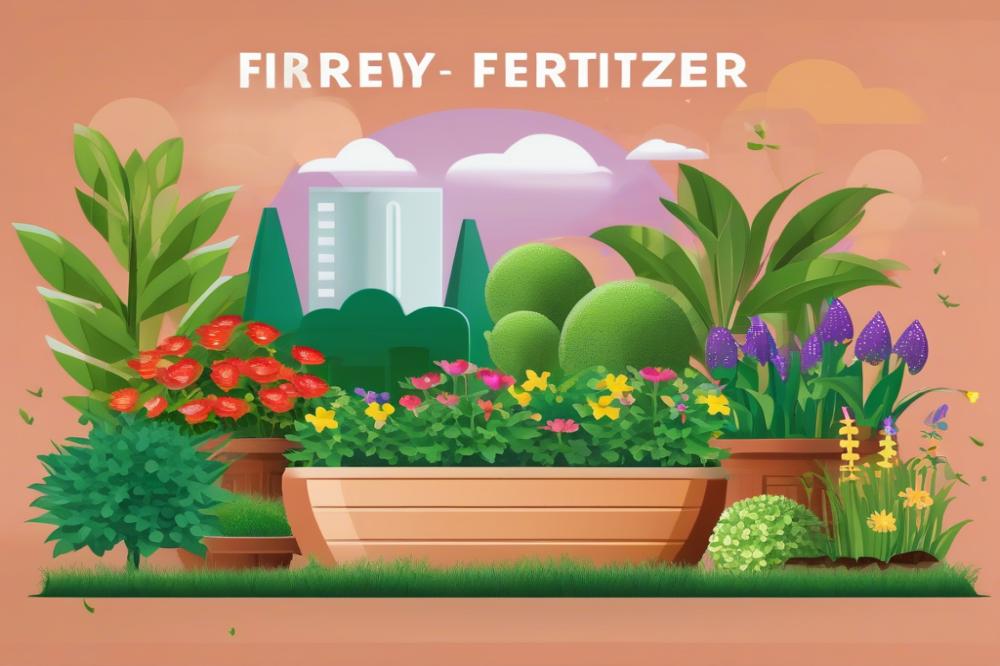Introduction
fertilizers play a vital role in gardening, providing essential nutrients that plants need to thrive. Healthy soil is the foundation of successful plant growth, and fertilizers help enhance its quality. Understanding the differences between organic fertilizers and synthetic fertilizers is crucial for every gardener. Each type offers distinct advantages and disadvantages, which can significantly influence gardening practices.
Many gardeners unknowingly fall prey to fertilizer myths that can hinder their efforts. These misconceptions may lead to inadequate fertilizer application, resulting in nutrient deficiencies. A lack of knowledge about how fertilizers work can negatively impact soil health and ultimately diminish plant growth. To successfully cultivate a vibrant garden, it’s essential to dispel these myths.
Proper fertilizer management relies on practices like soil testing and composting. These methods help determine the specific needs of plants and improve the effectiveness of applied nutrients. Additionally, gardeners should consider the environmental impact of their choices. Understanding how different fertilizers affect ecosystems can guide them in making better decisions.
Exploring these concepts further will empower gardeners with the knowledge needed for maintaining a flourishing garden. Clear and accurate gardening tips can help navigate the complexities of fertilizer use. Let’s delve deeper into these common misconceptions and understand how to avoid them.
fertilizer myths


Many gardeners hold misconceptions about fertilizers that can lead to poor results. A common belief is that organic fertilizers are always better than synthetic ones. In reality, both types can effectively promote plant growth when used correctly. Some think organic fertilizers are completely free from chemicals. However, even natural options can contain substances that might affect the environment negatively.
Another misconception revolves around the idea that synthetic fertilizers damage soil health. This notion oversimplifies the issue. When applied properly and in the correct amounts, synthetic fertilizers can enhance soil quality. Overuse of them, however, can lead to nutrient deficiencies and other problems for plants and soil alike.
Many gardeners assume that all plants thrive on the same type of fertilizer. In fact, different species have varying nutrient needs. Soil testing is crucial to determine which nutrients are lacking. Tailoring fertilizer application to specific plants can foster better growth.
Composting is often seen as a foolproof solution. While it benefits soil health, relying solely on compost may not provide all essential nutrients. Knowing what each plant needs means you might still need to supplement with additional fertilizers.
People sometimes believe that natural fertilizers will not harm the environment. Although they are often perceived as safer, their use can still have an impact. For instance, runoff from organic fertilizers can contribute to water pollution, just like synthetic options. Each type of fertilizer has potential downsides if not managed carefully.
Effective gardening practices involve understanding these complexities. It is vital for gardeners to research and apply fertilizers wisely. Dismissing one type entirely in favor of another might limit success. By expanding knowledge on fertilizers, gardeners can make informed decisions for their plants.
Understanding Fertilizers


Fertilizers come in various types, with two main categories being organic and synthetic. Organic fertilizers derive from natural materials like plant waste or animal manure. They release nutrients slowly, promoting soil health over time. Farmers and gardeners often use them to enrich the soil naturally. On the other hand, synthetic fertilizers are chemically manufactured. They provide nutrients to plants quickly but can lead to nutrient deficiencies in the long run if overused.
Each type of fertilizer affects plant growth differently. Organic options improve the soil structure and encourage healthy microbial activity. This natural approach creates a balanced ecosystem in your garden. Synthetic fertilizers, while offering immediate benefits, can disrupt the soil life if applied incorrectly. Immediate boosts in plant growth may come at a cost, such as harming beneficial organisms in the soil.
Choosing the right fertilizer involves understanding your garden’s specific needs. Soil testing can reveal nutrient levels and deficiencies. This information allows gardeners to tailor their fertilizer application effectively. Composting is another excellent option. It turns kitchen scraps and yard waste into nutrient-rich organic matter, benefiting plant health immensely.
Some people believe that more fertilizer equates to healthier plants. In reality, this can lead to an imbalance. Too much fertilizer harms the environment and can result in run-off that contaminates local waterways. Gardeners should follow sound gardening practices and avoid excess application. Balance is key for sustaining soil health and supporting long-term plant growth.
Understanding the environmental impact of both types of fertilizers is crucial. Organic fertilizers generally have a lower ecological footprint. Using them helps maintain biodiversity in the soil. Conversely, excessive use of synthetic fertilizers can lead to pollution and other negative effects on our surroundings. Engaging in responsible gardening practices ensures we care for our gardens and the planet.
Nutrient Deficiencies and Soil Testing


Understanding nutrient deficiencies is crucial for healthy plant growth. Many gardeners believe that simply throwing fertilizer on their plants will solve any issues. This idea can lead to significant problems, especially if they don’t know what their soil truly needs. Soil testing acts as a guide, helping to identify specific nutrient needs before applying any fertilizers.
Not all fertilizers are created equal. Organic fertilizers enrich the soil in different ways compared to synthetic options. By knowing the nutrient levels in your soil, you can choose the right type to enhance your gardening practices. If you apply the wrong kind, you risk worsening soil health, which can impact your entire garden.
Myths around fertilization can mislead even the most experienced gardeners. An assumption that more fertilizer means healthier plants is misleading. Over-fertilizing can actually cause harm by creating nutrient imbalances. Soil testing reveals the real conditions of your garden, allowing for informed fertilizer application tailored to your plants’ needs.
Moreover, composting is an excellent way to improve soil quality naturally. It adds essential nutrients back into the earth while promoting beneficial microorganisms. These processes help the soil retain moisture and improve its overall health. A healthy soil system supports robust plant growth and can reduce the long-term environmental impact of gardening.
Testing your soil can be simple and rewarding. Home testing kits are readily available, making it accessible for everyone. Additionally, local agricultural extensions often provide testing services at little to no cost. Knowledge gained from these tests empowers gardeners to make better choices and fosters a thriving gardening environment.
Best Practices for Fertilizer Application


Applying fertilizer correctly is crucial for healthy plants. Many gardeners worry about how much and how often to apply nutrients. Some believe that more is always better, but that’s simply not true. Over-fertilization can lead to nutrient burn, which damages plants. Understanding the right balance is key to promoting healthy growth.
Soil testing is a smart practice before starting any fertilization. An analysis of your soil reveals nutrient deficiencies that may be affecting plant health. This knowledge allows you to tailor your fertilizer choices accordingly. Both organic fertilizers and synthetic fertilizers can provide essential nutrients. Choose based on your personal gardening philosophy and the environmental impact of your choices.
Frequency of application is another area filled with misconceptions. Some gardeners feel the need to fertilize weekly, but that can lead to problems. Many plants require feeding only a few times during the growing season. Follow recommended schedules found on fertilizer packages or suggested by soil tests. This approach saves time and helps maintain soil health.
Incorporating composting into gardening practices adds organic matter to the soil. Organic fertilizers, including compost, offer a slow release of nutrients. This slow feeding benefits plants over time, allowing for steady growth. Synthetic fertilizers may act quickly but often do not support long-term soil vitality.
Different plants have varied nutrient needs. Some thrive in nutrient-rich conditions, while others prefer leaner soils. Always research the specific requirements of your plants. This guidance helps in determining the right amount of fertilizer for optimal health. A quick glance at growth patterns can indicate if adjustments are necessary.
Keep an eye out for signs of nutrient deficiencies in your plants. Yellowing leaves may indicate nitrogen shortage, while brown edges can signal a lack of potassium. Addressing these issues promptly is essential. Adjust your fertilizer application based on observations and soil testing results.
Ultimately, responsible fertilizer use is essential for sustainable gardening. Balancing the use of various fertilizers helps maintain both plant health and environment integrity. Remember, gardening is about nurturing, and with the right techniques, you can promote flourishing growth.
Composting as a Fertilizer Alternative
Composting has become a go-to method for many gardeners looking for a natural way to nourish their plants. It involves the breakdown of organic waste like food scraps, yard clippings, and other biodegradable materials. As these materials decompose, they transform into a rich, dark substance known as compost. This end product serves as an effective alternative to synthetic fertilizers.
One significant myth surrounding compost is that it cannot provide essential nutrients for plant growth. Some believe that only synthetic fertilizers can deliver the required nutrients. In reality, compost enriches the soil, helping to improve its overall health. Nutrient deficiencies can be addressed through regular composting practices. Various nutrients, such as nitrogen, phosphorus, and potassium, are naturally present in compost.
Soil health is crucial for thriving gardens. Using compost can enhance soil structure, allowing better water retention and aeration. This process ultimately fosters a more favorable environment for plant roots to develop. Regularly incorporating compost into your gardening practices can improve the soil’s ability to support plants over time.
Another common misconception is that composting is too lengthy or complicated. While it can take several months for materials to break down completely, simple methods, like using a compost bin or pile, can speed up the process. Some gardeners opt for a hot composting method to accelerate decomposition. This method can produce usable compost within a relatively short timeframe.
Soil testing is often advised to monitor nutrient levels and composition. However, those who rely solely on synthetic fertilizers might miss the opportunity to improve overall soil structure through composting. By adding compost, gardeners contribute to a balanced ecosystem that synthetic options cannot match. The environmental impact of composting also deserves attention. Waste that would typically end up in landfills can instead enrich gardens and reduce pollution.
Understanding the role of compost in plant nutrition can change how gardeners approach their fertilization methods. Compost not only nourishes plants but also promotes biodiversity in the soil. The microorganisms and beneficial bacteria found in compost aid in nutrient absorption and enhance plant resilience. This organic solution can create a more sustainable gardening practice. Shift your perspective on fertilizers, and consider the many advantages of composting.
Environmental Impact of Fertilizers
The use of fertilizers in gardening creates a lively debate around environmental concerns. Many assume that organic fertilizers are always better for the earth. However, this is not as clear-cut as it seems. Both organic and synthetic fertilizers have their impacts, and understanding these can help you make informed decisions.
The application of synthetic fertilizers can lead to nutrient runoff. When it rains, excess nutrients may wash into nearby streams and rivers. This runoff causes problems like algal blooms, which deplete oxygen in the water. Such situations can harm aquatic life. In contrast, organic fertilizers often break down slowly, providing a steady source of nutrients that can benefit soil health without causing immediate runoff issues.
Soil testing is crucial for determining what your garden needs. Nutrient deficiencies can be identified, allowing gardeners to apply fertilizers more accurately. This practice minimizes waste and protects the environment. Different gardening practices can influence how fertilizers affect the land. For example, methods like composting return organic matter to the soil, enhancing its quality naturally.
Another myth is that organic fertilizers are completely harmless. While they are generally more eco-friendly, they can also contribute to pollution if over-applied. Balancing the application rates is essential, even with organic options. Smart gardeners will consider the specific needs of their plants rather than applying fertilizers indiscriminately.
Furthermore, the source of the fertilizer matters. Some organic fertilizers come from animal byproducts, which can have their own complications. These sources might lead to methane emissions, a potent greenhouse gas. Gardeners who prioritize sustainable practices should look for fertilizers that have a lower carbon footprint.
All fertilizers, whether synthetic or organic, have unique characteristics that can affect plant growth. It’s vital to choose the right type for your specific gardening goals. Each option has its benefits and drawbacks, and awareness of these can promote better environmental stewardship. Understanding the full picture helps gardeners make sustainable choices that are beneficial for both their plants and the planet.
Wrapping Up Insights on Fertilizers
In summary, understanding fertilizers is crucial for every gardener. Knowledge is power, especially when it comes to promoting a healthy garden. We learned that not all fertilizers are created equal. Organic fertilizers can offer essential nutrients while supporting the ecosystem. On the other hand, synthetic fertilizers may provide quick fixes but often come with long-term consequences.
Diving into common misconceptions reveals just how vital it is to base gardening practices on science, not hearsay. Over-fertilizing, for instance, can damage plants rather than help them thrive. Additionally, the idea that more fertilizer equals more growth is misleading. Balanced feeding is imperative for optimal plant health. Gardens benefit from proper practices rather than mere attempts to boost yield.
Ultimately, well-informed decisions can lead to lush, vibrant gardens. Educating ourselves and others will help transform gardening into a more rewarding experience. It’s time to use what we learned to foster growth that is sustainable and healthy. Let’s commit to gardening wisely, embracing practices that respect both our plants and the planet.



